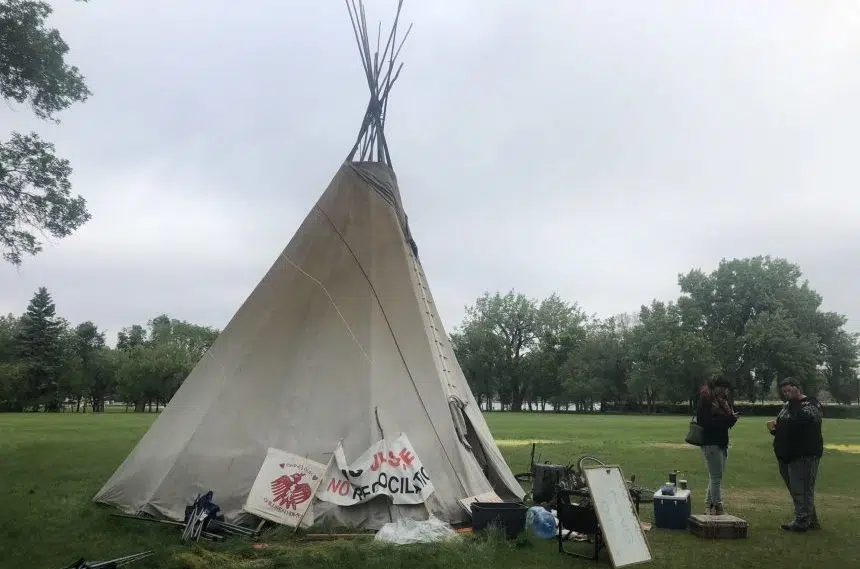Members of the Justice for our Stolen Children Camp in Regina were woken up by the harsh lights of trucks shining on their tents as the sun began to rise Friday morning.
It was the 108th day for the group who set up camp after acquittals for Gerald Stanley in his murder trial for the killing of Colten Boushie and Raymond Cormier, who was accused of murder in the death of Tina Fontaine.
According to people staying at the camp, police and other officials arrived just before 5 a.m. Friday to remove the tents.
“They showed up with their big white dump trucks and hauled away people’s possessions, their homes their blankets, their everything,” said Robyn Pitawanakwat, a camp supporter who speaks for the Colonialism No More activist group.
Within a few hours, all that remained at the campsite were a few blankets and bags of clothing, some signs and the teepee which must be removed by noon on Sunday.
Pitawanakwat had said they knew the government would eventually show up to remove them, they just didn’t know when.
In a written statement later in the morning, the province said protests are allowed at the Saskatchewan Legislature but they must follow certain guidelines.
The province said they had indicated to the camp on March 1 they were in violation of the Provincial Capital Commission Act which states overnight camping, erecting tents or structures, burning wood or combustibles and erecting signage are not allowed in Wascana Park.
A written notice was given to the camp on June 2 telling protesters the camp had to be removed by June 5.
“It’s devastating, so many people have put their love, their energy, their all into this camp and it has brought healing to many families that have not been able to find that kind of support anywhere else,” Pitawanakwat said.
Pitawanakwat said there’s still “vague hope” they will still be able to meet with the government.
She also mentioned the timing of the removal is bizarre, with it being Aboriginal History Month and days before National Aboriginal Day.
“While flags, Treaty 4 and Metis flags are flying on the (Albert Street Bridge), this is when they decide to clear out the Indigenous people in preparation for Canada Day,” Pitawanakwat said.
Gaylene Henry was also present as officials tore down the camp. She is the cousin of Richelle Dubois who started the camp after her son, Haven, drowned to death in a Regina creek. Dubois had been pushing for an inquest into her son’s death following the investigation and coroner’s report.
Henry said Friday morning felt like a raid.
“I know have a sense of feeling of what my ancestors felt getting rolled up on and getting removed,” Henry said. “You’re woken up and it’s kind of chaotic and you’re just shuffled, shuffled along.”
She said the members of the camp just sat back while officers and officials removed the tents and structures.
Henry said she wasn’t surprised the camp was getting removed.
“This is just another knockdown in a long line of fights.”











